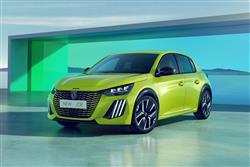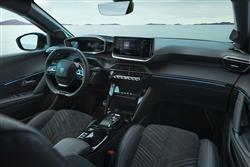Peugeot 208 - ABC Leasing
How will you view?
This is a sample, showing 30 seconds of each section.
LOVE AND EIGHT(some text hidden)
By Jonathan Crouch
Ten Second Review word count: 103
With this second generation 208 supermini, here usefully improved, Peugeot has brought us a small car that really pushes the boundaries in supermini design. This 208 model's engineering may not quite be unique, but all the feel-good stuff really is - the pavement presence, the avant garde cabin. Plus that's been delivered with most of the practicality and efficiency you'll need from a small hatch. Here's a car that's made other brands in its sector really sit up and take notice. And, we think, quite a few buyers who'd never normally choose a Peugeot in this class are going to do the same.
Background word count: 148
What exactly should a supermini be? Affordable? Economical? Practical? All these things are important of course, but if you're a car maker and that's all you create to sell in this segment, then you'd better be prepared to sell it very cheaply. Even in this humble category you see, buyers are now expecting more in terms of style, innovation and technology. In fact, they're expecting something more like this, the revitalised version of Peugeot's MK2 model 208. The second generation 208 was first launched in 2019 and has since gone on to sell very well indeed; in fact, in 2022 it was Europe's best-selling car, de-throning the Volkswagen Golf after 15 years. Here, we're looking at the mid-term facelift applied to this car, announced in Summer 2023. There are new Hybrid engines, an upgrade for the EV version and smarter looks across the range. Plenty to talk about.
Driving Experience word count: 339
The range kicks off with two familiar units, the un-electrified 75hp and 100hp 1.2-litre PureTech petrol powerplants from before, mated respectively to either 5-speed or 6-speed manual gearboxes. There's no longer a diesel option. Engine-wise, this big news with this facelifted model is that above these conventional engine choices, Peugeot has introduced two new Hybrid powertrains. These pair 100hp and 136hp versions of that same three cylinder 1.2-litre PureTech petrol engine with a 6-speed auto gearbox featuring an integrated 48V electric motor. Peugeot claims that this will allow the car to run in pure-electric mode for over 50% of the time in town. If you don't want a Hybrid, then you'll be pleased to know that the The EV E-208 electric model has evolved too, gaining a new 156hp motor and a larger 51kWh battery offering a longer range of 248 miles. For most E-208s though, Peugeot is continuing to offer the old EV drivetrain, which sees a 50kWh battery matched to a 136hp electric motor, offering a range of up to 225 miles. Bear in mind that in both its forms, the E-208 is around 350kgs heavier than the ordinary version. What about the driving experience across the 208 range? That hasn't changed much. What should a small French family car feel like to drive? Much like this, we think. Peugeot hasn't bothered trying to be sporty, firm and Germanic here, so the damping control is gentle and allows for a bit of chassis movement, but gets firmer when the body starts pitching about - as it will do if you start pushing this car into corners in the kind of way a typical owner never would. Predictably, the resulting confection doesn't give you the alert responses you'd get in some rivals but for the kind of urban driving that cars of this sort tend to do, we think it's pretty well judged. What it lacks in handling finesse is well compensated for by the languid and properly Gallic way the car handles speed humps and tarmac tears.
Pictures (High res disabled)

.jpg)

Scoring
Category: Compact Car
| Performance | |
| Handling | |
| Comfort | |
| Space | |
| Styling | |
| Build | |
| Value | |
| Equipment | |
| Economy | 70% |
| Depreciation | 70% |
| Insurance | 70% |
| Total | 70% |